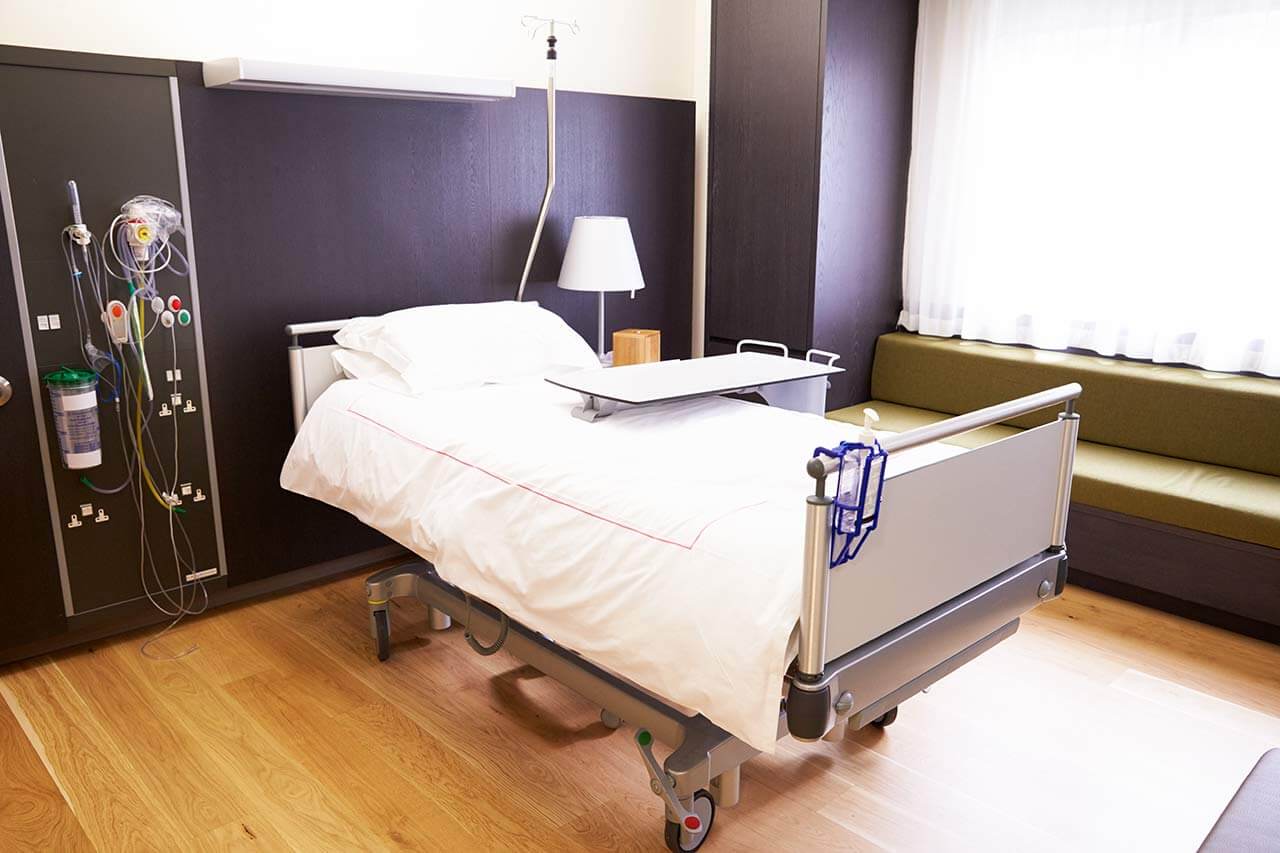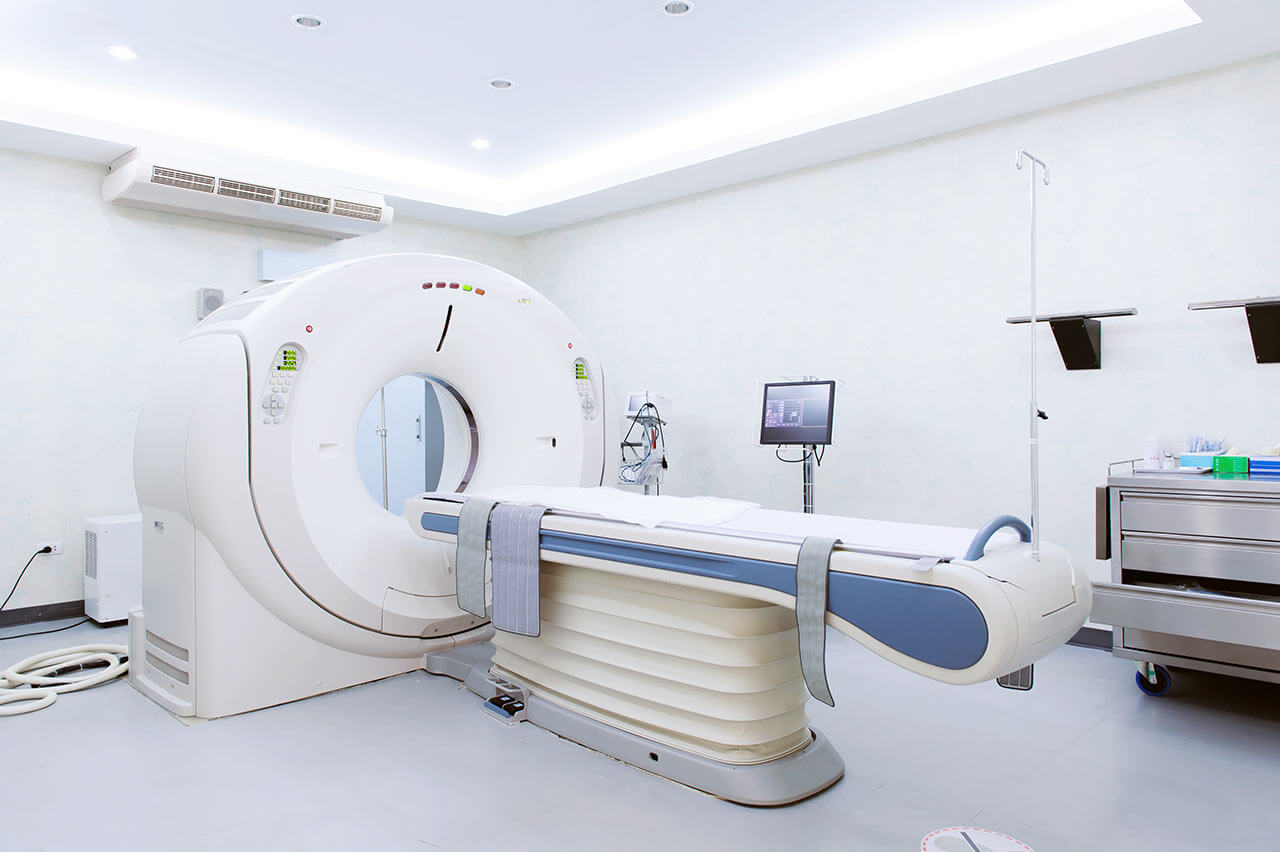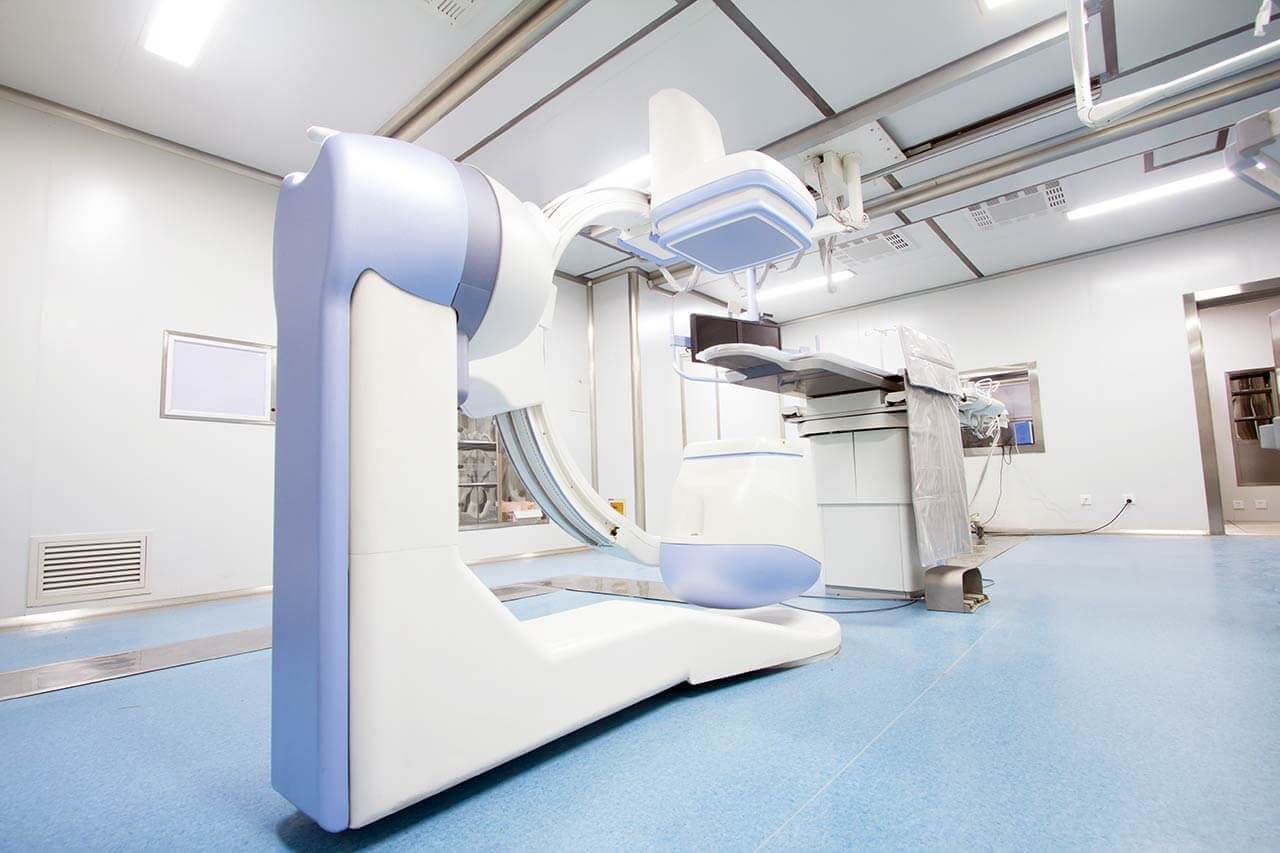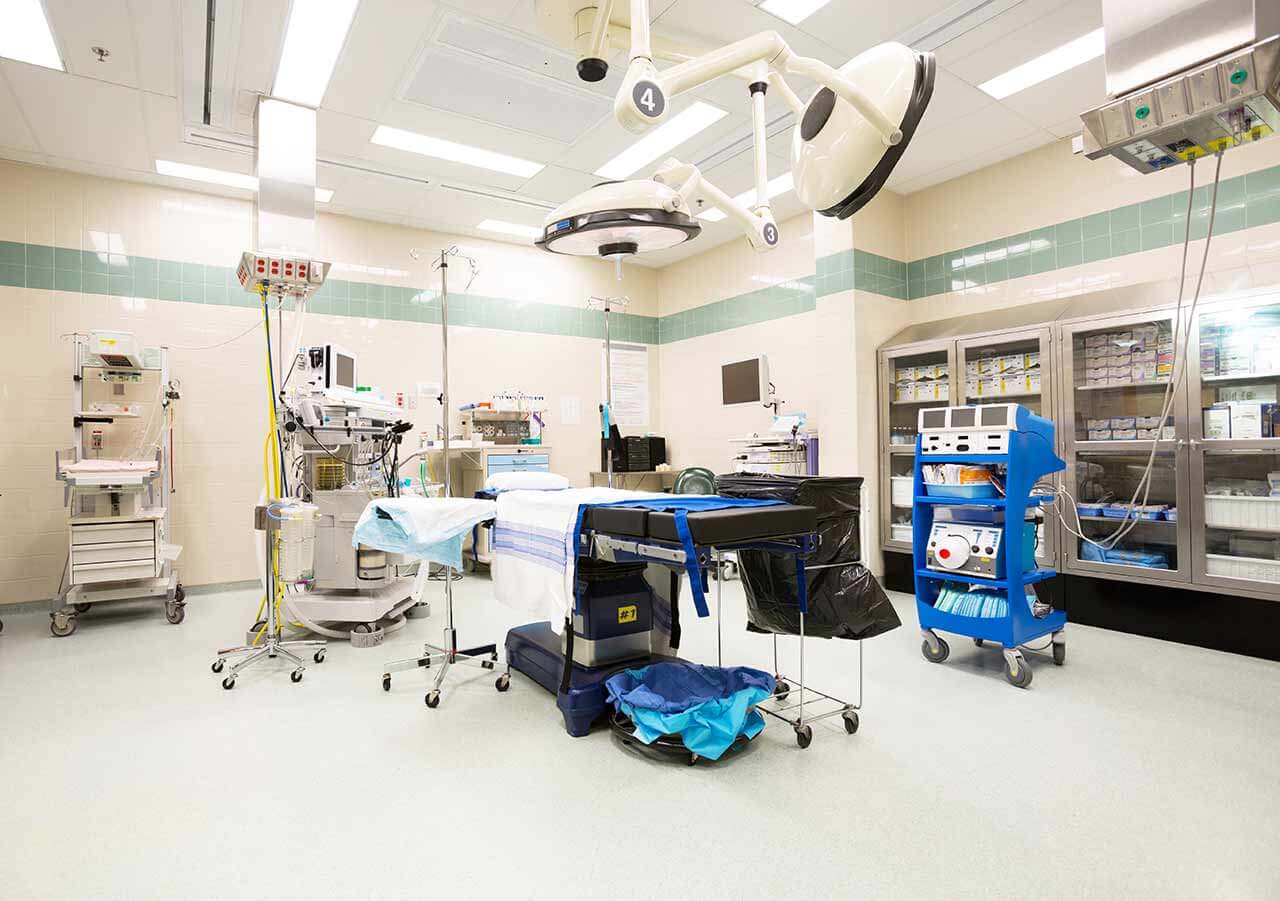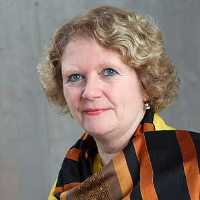
The program includes:
- Initial presentation in the clinic
- clinical history taking
- physical examination
- review of medical records
- laboratory tests:
- complete blood count
- general urine analysis
- biochemical analysis of blood
- TSH-basal, fT3, fT4
- tumor markers
- indicators of inflammation
- indicators of blood coagulation
- CT scan / MRI of the abdomen and chest
- ultrasound / X-ray examination
- conducting 1 course of chemotherapy
- symptomatic treatment
- the cost of essential medicines and materials
- nursing services
- control examinations
- explanation of future recommendations
How program is carried out
During the first visit, the doctor will conduct a clinical examination and go through the results of previous laboratory tests and instrumental examinations. After that, you will undergo an additional examination, including laboratory assessment of liver and kidney function, ultrasound scan. Based on the received results, the doctor will elaborate the chemotherapy regimen. If necessary, related medical specialists will be involved in the elaboration of a treatment regimen (tumor board).
Chemotherapy is carried out as the day hospital procedure, without mandatory admission to the hospital. After the placement of a venous catheter, you will stay in a comfortable ward. An infusion system will be connected to the catheter, through which the required drug or a drug combination will be administered. All drugs are administered by intravenous drip, slowly, so the total duration of the infusion can be up to several hours. All this time, doctors and nurses will monitor your health condition closely.
After the course of chemotherapy, you will stay under medical supervision in the ward for a few more hours. If your general condition is good, your doctor will allow you to leave the hospital. You will receive the medical report with detailed recommendations regarding further treatment. In the future, you will be able to have a distant consultation with your attending physician and schedule the next course of chemotherapy, if necessary.
Required documents
- Medical records
- MRI/CT scan (not older than 3 months)
- Biopsy results (if available)
Service
You may also book:
 BookingHealth Price from:
BookingHealth Price from:
About the department
The Department of Pediatric Oncology and Hematology at the Charite University Hospital Berlin provides comprehensive medical services in its areas of expertise. The department's team of physicians specializes in the treatment of malignant diseases of the hematopoietic system, benign and malignant solid tumors of various locations, congenital and acquired blood clotting disorders, including sickle cell anemia, thalassemia, and hemophilia. More than 50 bone marrow transplantation procedures for children are performed in the department annually – the clinic is one of the leading centers in Germany in this field. Each year, more than 120 children and adolescents receive treatment in the department, most of whom are admitted with particularly complex diseases. Since 2017, the department has had the status of a specialized cancer center with DKG certification, which confirms the outstanding quality of treatment and excellent effectiveness indicators. The medical facility is also certified as a specialized Hemophilia Treatment Center. The department's physicians select the optimal treatment regimen for each child, taking into account the stage of the disease, the patient's age, and general condition. Special attention during treatment is given to psychological support for the child and parents, for whom a cancer diagnosis is associated with tremendous emotional distress. The Head Physician of the department is Prof. Dr. med. Angelika Eggert.
The team of pediatric oncologists focuses on children with leukemias, lymphomas, brain tumors, neuroblastomas, and Ewing's sarcomas. The department is a certified Pediatric Oncology Center with many years of experience in helping children with cancer. Specialists use a multimodal treatment concept that combines several therapeutic methods to achieve complete cure or long-term remission. For leukemia or lymphoma, the main treatment method is chemotherapy, often combined with bone marrow transplantation – these methods are the most effective for this group of diseases. In the case of solid tumors, treatment is usually based on surgical resection of the malignant neoplasm in combination with chemotherapy and/or radiation therapy.
In the field of hematology, the department offers diagnosis and treatment of all diseases of the hematopoietic system in children, with a special emphasis on sickle cell anemia, thalassemia, and Fanconi anemia. It also provides counseling for children with blood clotting disorders: thrombophilia, hemophilia, von Willebrand disease, thrombocytopenia, thrombocytopathy, and others. It is important to note the department's high expertise in the treatment of hemophilia – it is certified by the European Network of Hemophilia Treatment Centers (EUHANET) and the German Hemophilia Treatment Society (DHG). For the treatment of hemophilia in children, effective replacement therapy with blood clotting factor concentrates is provided.
The department's specialists are also justifiably proud of their successful results in the field of bone marrow transplantation in children – more than 50 such procedures are performed here annually. This treatment is used for young patients with relapsed acute lymphoblastic leukemia and acute myeloid leukemia, high-risk neuroblastoma, Fanconi anemia, and immunodeficiency conditions. The department's physicians specialize in autologous and allogeneic bone marrow transplantation: in the first case, the child's own stem cells are transplanted, and in the second case, donor cells are used.
The department's specialization includes:
- Diagnostics and treatment of cancer in children
- Diagnostics and treatment of acute lymphoblastic leukemia
- Diagnostics and treatment of acute myeloid leukemia
- Diagnostics and treatment of lymphomas
- Diagnostics and treatment of brain tumors
- Diagnostics and treatment of neuroblastoma
- Diagnostics and treatment of Ewing's sarcoma
- Diagnostics and treatment of kidney tumors
- Diagnostics and treatment of embryonal tumors
- Diagnostics and treatment of hematopoietic system diseases
- Diagnostics and treatment of sickle cell anemia
- Diagnostics and treatment of thalassemia
- Diagnostics and treatment of Fanconi anemia
- Diagnostics and treatment of Diamond-Blackfan anemia
- Diagnostics and treatment of aplastic anemia
- Diagnostics and treatment of neutropenia
- Diagnostics and treatment of blood clotting disorders
- Diagnostics and treatment of arterial and venous thrombosis
- Diagnostics and treatment of thrombophilia
- Diagnostics and treatment of hemophilia
- Diagnostics and treatment of von Willebrand disease
- Diagnostics and treatment of rare deficiencies of a single blood clotting factor
- Diagnostics and treatment of thrombocytopenia
- Diagnostics and treatment of thrombocytopathies
- Diagnostics and treatment of other diseases
The range of therapeutic services offered by the department includes:
- Surgical resection of solid tumors (in collaboration with pediatric surgeons)
- Chemotherapy
- Radiation therapy
- Bone marrow transplantation
- Autologous bone marrow transplantation
- Allogeneic bone marrow transplantation
- Other treatment methods
Curriculum vitae
- 1993 Study of Medicine at the University of Essen, Germany.
- 1991 - 1993 Doctorate, Institute of Molecular Biology, University of Essen, Germany. Subject: "Preparation and characterization of adenovirus 12-specific polyclonal antibodies directed against specific E1A tumor antigens".
- 1993 - 1997 Resident Physician, Department of Pediatric Hematology and Oncology, University Hospital Essen, Germany.
- 1997 - 2000 Postdoctoral Research Fellow of the Group of Prof. G.M. Brodeur (Deutsche Krebshilfe/Wolfson Career Development Grant), Children’s Hospital of Philadelphia, USA.
- 2000 - 2002 Clinical Fellow, Department of Pediatric Hematology and Oncology, University Hospital Essen, Germany.
- 2003 - 2004 Senior Physician, Department of Pediatric Hematology and Oncology, University Hospital Essen, Germany.
- 2004 Habilitation, University of Duisburg-Essen, Germany. Subject: "Expression and biological function of neurotrophin receptors and receptors of the TNF-family in embryonal tumors".
- 2005 - 2008 C3 Professor of Pediatric Oncology and Deputy Director, Department of Pediatric Hematology and Oncology, University Hospital Essen, Germany.
- 2006 - 2008 Interim Director, Department of Neonatology, Neuropediatrics and Pediatric Intensive Care Medicine.
- Since 2007 Director, University Hospital Essen, Comprehensive Cancer Center (WTZ).
- Since 2008 Head of the Department of Pediatric Hematology, Oncology, Pulmonology and Cardiology, University Hospital Essen, Germany.
- 2009 - 2011 Executive MBA in the International Hospital & Health Care Management, Frankfurt School of Finance and Management, Germany.
- Since 2013 W3 Professor in Pediatrics and Head of the Department of Hematology and Oncology, Charite University Hospital Berlin.
- Acting Head of the Department of Pediatric Gastroenterology and Metabolic Medicine, Charite University Hospital Berlin.
Memberships
- Since 1994 Member of the German Society of Pediatrics.
- Since 1998 Member of the American Association for Cancer Research (AACR).
- Since 2000 Member of the German Society for Pediatric Hematology and Oncology (GPOH).
- Since 2000 Member of the International Society for Pediatric Oncology (SIOP).
Awards
- 1997 Young Investigator Award, International Symposium on Advances in Neuroblastoma Research, City of Bath, United Kingdom.
- 1998 Evans Prize, International Symposium on Advances in Neuroblastoma Research, Philadelphia, USA.
- 2000 Poster Prize of the German Society of Pediatrics.
- 2000 Dr. Odile Schweisguth Prize, SIOP Meeting, Amsterdam, the Netherlands.
- 2000 Research Prize of the WTZ, Essen, Germany.
- 2001 AACR Young Investigator Award, New Orleans, USA.
- 2001 Kind Philipp Prize in Pediatric Oncology, GPOH-Meeting, Frankfurt, Germany.
Photo of the doctor: (c) Charité – Universitätsmedizin Berlin
About hospital
According to the reputable Focus magazine, the Charite University Hospital Berlin ranks 1st among the best healthcare facilities in Germany!
The hospital is one of the largest and leading university medical complexes in Europe, and also consistently holds leading positions in the international medical arena. The Charite operates on the basis of the Faculty of Medicine of the Free University of Berlin and the Humboldt University of Berlin. Patients are offered modern diagnostics and treatment with the very latest methods, many of which were developed by professors and scientists of the medical complex. More than half of all German Nobel Prize winners in medicine and physiology, such as Emil von Behring, Robert Koch, and Paul Ehrlich, studied and worked at the Charite University Hospital Berlin. The medical complex includes more than 100 specialized departments and institutes, which helps to ensure that patients receive care in all existing medical specialties. The hospital has exceptional experience in treating complex clinical cases.
Each year, the hospital treats more than 137,800 inpatients and more than 787,700 outpatients. The hospital has a bed capacity of 3,293 beds. A huge medical team consisting of 5,670 scientists and doctors and more than 6,000 nurses work for the benefit of the patients. The main task of all specialists of the medical facility is to restore the patient's health or save his life in critical cases. The hospital has a friendly atmosphere where every patient feels care, respect and empathy.
The Charite University Hospital Berlin is generously funded by the German government, which is why it offers patients the latest generation of excellent equipment and comfortable infrastructure. The Charite medical complex is equipped with da Vinci robotic surgery systems, laser technologies, equipment for endovascular catheter-based interventions, neuronavigation devices, intraoperative monitoring systems, equipment for proton therapy available only in the most advanced medical centers in the world, and many other technologies. All these resources, combined with the experience and professional skills of the hospital's doctors, are the key to providing the most effective and safe treatment in accordance with the highest international medical standards.
The hospital is recognized with a huge number of quality certificates, including DIN EN ISO 9001:2015, certificates from the German Cancer Society (DKG), the German Society for General and Visceral Surgery (DGAV), the German Society for Thoracic Surgery (DGT), the German Hernia Society (DHG), and the ERAS Society.
The Charite University Hospital Berlin is a benchmark in the European healthcare system. Patients therefore receive impeccable medical service, quality care, and personalized service that puts the patient and their individual needs first.
Photo: (с) depositphotos
Accommodation in hospital
Patients rooms
The patients of the Charite University Hospital Berlin live in comfortable rooms made of modern design. Each room is equipped with an ensuite bathroom with a toilet and a shower. The standard room furnishing includes an automatically adjustable bed, a bedside table, a wardrobe for storing clothes, a table and chairs for receiving visitors, and a TV. If desired, Wi-Fi access can be provided. The hospital also offers enhanced-comfort rooms.
Meals and Menus
The patient and his accompanying person have a daily choice of three menus. If for any reason, you do not like the food, you will be offered an individual menu. Please inform the medical staff about your dietary preferences before the treatment.
Further details
Standard rooms include:
Religion
Religious services are available upon request.
Accompanying person
During the inpatient program, an accompanying person may stay with you in a patient room or at the hotel of your choice.
Hotel
During the outpatient program, you can live at a hotel of your choice. Managers will help you to choose the most suitable options.
The hospital offers a full range of laboratory tests (general, hormonal, tests for infections, antibodies, tumor markers, etc.), genetic tests, various modifications of ultrasound scans, CT scans, MRI and PET / CT, angiography, myelography, biopsy and other examinations. Treatment with medications, endoscopic and robotic operations, stereotaxic interventions is carried out here, modern types of radiation therapy are also used. The hospital offers patients all the necessary therapeutic techniques.
- Proton therapy
- CyberKnife treatment
- Hyperthermic intraperitoneal chemotherapy (HIPEC)
- PSMA therapy with Lutetium-177
- Joint replacement in adults and children
These are oncological diseases, benign neoplasms of the brain and spinal cord, heart valve defects, diabetes mellitus and its complications, joint diseases and other pathologies.
- Neurosurgery
- Oncology
- Plastic and reconstructive surgery
- Interventional radiology
- Proton therapy (Proton Therapy Center BerlinProtonen)
The medical team includes more than 4,225 highly qualified scientists and doctors.
